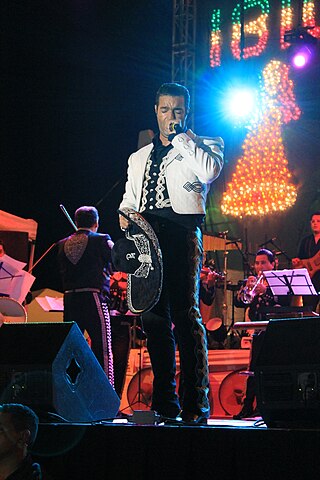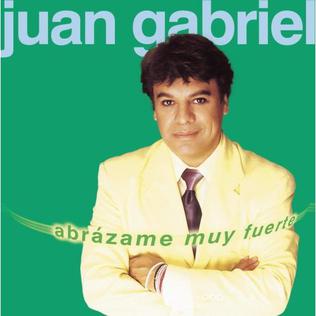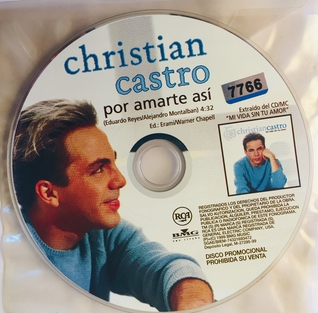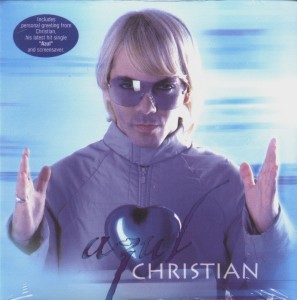
Alberto Aguilera Valadez, known professionally as Juan Gabriel, was a Mexican singer-songwriter and actor. Colloquially nicknamed Juanga and El Divo de Juárez, Juan Gabriel was known for his flamboyant style, which broke norms and standards within the Latin music industry. Widely regarded as one of the best and most prolific Mexican composers and singers of all time, he is regarded as a pop icon.

Pablo Montero is a Mexican singer and actor. Montero's primary profession is singing, but he also acts regularly in telenovelas produced by Televisa productions in supporting roles. Montero is widely recognized and considered one of the most popular supporting actors in telenovelas.

Mi Reflejo is the second studio album and first Spanish-language album by American singer Christina Aguilera. It was released on September 12, 2000, as a joint effort between RCA Records and BMG U.S. Latin. After the commercial success of her debut studio album effort, Christina Aguilera (1999), Aguilera recorded her follow-up project during 2000. It includes five Spanish-language versions of tracks from her previous album, in addition to four original compositions and two cover songs. The tracks were adapted and composed by Rudy Pérez who also produced the album.

En éxtasis is the fourth studio album by Mexican singer Thalía, released on 12 September 1995, by EMI Latin. The album became a huge success in Latin America and other countries. This is the first album Thalía recorded on the company EMI Music. It was also her first international release.

Aracely Arámbula Jáquez, known professionally as Aracely Arámbula, is a Mexican actress, model, singer, television personality and entrepreneur.
Jorge Avendaño is a Mexican pianist, composer, songwriter and music producer.
The 9th annual Billboard Latin Music Awards, which honor the most popular albums, songs, and performers in Latin music, took place May 9 in Miami. Winners are determined by the actual sales and radio airplay data that informs Billboard's weekly charts, including Top Latin Albums, and radio charts, including Hot Latin Tracks, during a one-year period from the issue dated Feb. 17, 2001 through the Feb. 9, 2002, issue.

Abrázame Muy Fuerte is the twenty-fifth studio album by Mexican singer-songwriter Juan Gabriel, released by BMG U.S. Latin on December 12, 2000. The title track is the theme song for the Mexican telenovela Abrázame Muy Fuerte (2000–2001), produced by Salvador Mejía Alejandre, Victoria Ruffo, Fernando Colunga and Aracely Arámbula starred as the protagonists, while César Évora, Nailea Norvind, Helena Rojo and Rossana San Juan, portrayed the antagonists. In 2002, the album was awarded at the Premio Lo Nuestro for Pop Album of the Year and was nominated for a Grammy Award for Best Latin Pop Album in the 44th Annual Grammy Awards.

"Por Amarte Así" is a song written by Alejandro Montalbán and Eduardo Reyes and performed by Mexican recording artist Cristian Castro. It was produced by Kike Santander and released in 2000 as the fourth single from his sixth studio album Mi Vida Sin Tu Amor (1999). Lyrically, the song is about a man who promises to keep loving his lover even though she is gone. In the United States, it peaked at number three and two on the Billboard Hot Latin Songs and Latin Pop Songs charts and received a Billboard Latin Music nomination for Pop Track of the Year. "Por Amarte Así" was the fifth best-performing Latin single of 2001 in the United States.

Iconos is the eighth Spanish album and tenth studio album by Marc Anthony which covers Latin ballads from the past and is the second Latin pop album by Marc Anthony after Amar Sin Mentiras. The album was first released on May 14, 2010 in Europe through Ariola Records, and May 25 in the US and UK with Sony Latin.

"Cuando Me Enamoro" is a Hispanic pop song written and performed by Spanish pop singer-songwriter Enrique Iglesias and featuring Dominican singer-songwriter Juan Luis Guerra released on 26 April 2010, as the first single from his ninth studio album. The song is the main-theme of the Mexican telenovela of the same title starring Silvia Navarro and Juan Soler. This is the second time since "Nunca Te Olvidaré" that a song of Enrique Iglesias was chosen as the main-theme of a telenovela. "Cuando Me Enamoro" became a contender for Latin Grammy Award for Song of the Year. The single has sold around a million digital downloads worldwide to the date. This song was dedicated for K,O,M.
"Entrégate" is a pop song written, produced and arranged by Juan Carlos Calderón, and performed by Mexican singer Luis Miguel. It was released as the second single from his Grammy Award nominated studio album 20 Años (1990), and became his fifth number-one single in the Billboard Top Latin Songs chart. The parent album became commercially successful, with sales records throughout Latin America, with six of its singles entered the charts in Mexico simultaneously. After its release, Miguel was recognized as the leading male vocalist in Latin America.
Lourdes Robles is a singer-songwriter and actress, born in San Juan, Puerto Rico. Her career started in the early 1980s as part of duo Lourdes y Carlos, releasing two albums. The duo split and Robles began a solo career, acting in "Barrio Cuatro Calles" and "Generaciones", along Puerto-Rican performer Chayanne. She also performed in some musical productions, including Hello, Dolly!, Into the Woods, and The Fantasticks.
"Abrázame Fuerte" is a ballad written by Jorge Luis Piloto, produced by Rudy Pérez and performed by Puerto Rican-American singer Lourdes Robles. The song was released as the second single from Robles' second studio album Imágenes (1990) and became her first number-one song in the Billboard Top Latin Songs chart in the United States and her biggest hit.

"Azul" (transl. "Blue") is a song by the Mexican singer Cristian Castro from his seventh studio album of the same name (2001). The song was co-written by brothers Kike and Gustavo Santander and produced by Kike, Andrés Munera, Fernando "Toby" Tobón. It is a pop rock power ballad in which the singer likens love to the color blue. The track was released on as the lead single from the album by BMG US Latin on 3 May 2001. A music video for "Azul" was directed by Pedro Torres and features Castro in a beach, house, and a nightclub with friends and premiered on 6 June 2001.
The 14th Lo Nuestro Awards ceremony, presented by Univision and honoring the best Latin music of 2001 and 2002, took place on February 7, 2002, at a live presentation held at the James L. Knight Center in Miami, Florida. The ceremony was broadcast in the United States and Latin America by Univision.
Abrázame muy fuerte may refer to:

"Así Fue" is a song written and produced by Mexican singer-songwriter Juan Gabriel and performed by Spanish singer Isabel Pantoja. It was released in 1988 as the second single from her studio album Desde Andalucía (1988). The song tells of the singer dealing with her ex-lover after she has a new fiancé. It reached No. 2 on the Billboard Hot Latin Songs chart in the United States, and was the fifth best-performing Spanish-language single of 1989 in the US. The song’s composer, Juan Gabriel, performed a live rendition of the song at the Palacio de Bellas Artes in Mexico City which was recorded and released as a live album titled Celebrando 25 Años de Juan Gabriel: En Concierto en el Palacio de Bellas Artes (1998).

"Júrame" is a song by American singer Gisselle from her seventh studio album, Voy a Enamorarte (2000). The song was written and produced by Colombian musician Kike Santander. It was recorded twice, as a pop ballad and a merengue track, respectively. In the lyrics, it deals with love's ambition. Both versions were released as a single from the album by BMG US Latin in 2000. A music video for the ballad version was filmed in Florida.

"Cómo Se Cura una Herida" is a song by American singer Jaci Velasquez for her fifth studio album Mi Corazón (2001). The song was written by Jorge Luis Piolto and Rudy Pérez with the latter handling its productions. It is a ballad, in which the narrator is devastated after being betrayed by her lover. The song was inspired by the divorce of her parents. A ranchera version of the track was also recorded.















